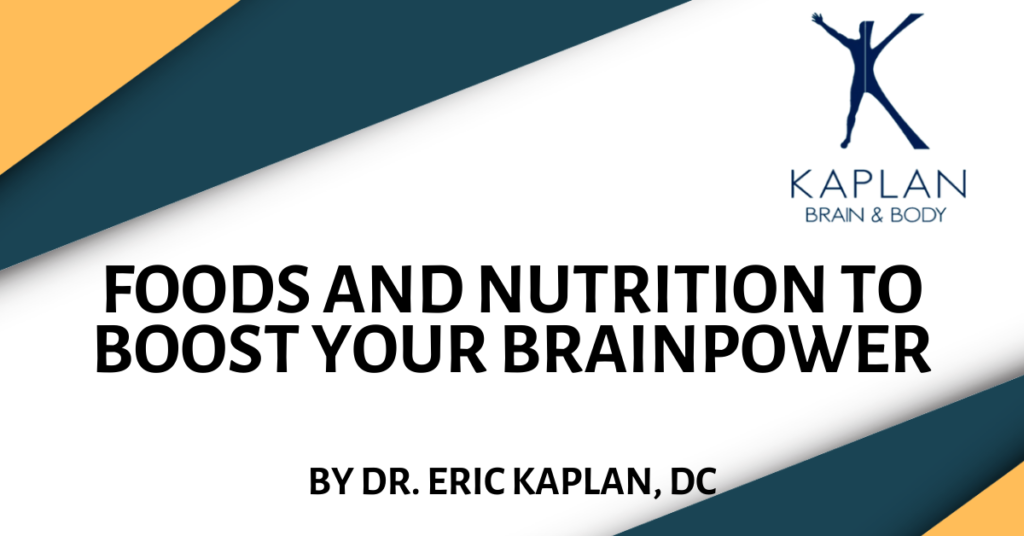
We can all agree that almost everyone knows, at least in theory, that they should eat healthy foods. People agree that eating fruits and vegetables has a multitude of benefits, like providing our bodies with whole-food sources of vitamins, minerals, fiber, and macronutrients (fats, proteins, and carbohydrates) that we need to help keep our bodies running smoothly. Eating proper nutrients helps keep our organs functioning and provides our body with the raw materials it needs to build healthy bones and produce healthy blood. It benefits digestion, metabolism, and, most importantly, the way the brain functions.
Eating bad foods, on the other hand, can harm your brain. If you consume highly inflammatory foods, your brain connections will decrease. These foods can cause a variety of problems such as trouble with memory, focus, motivation, organization, time management, depression, anxiety, anger, and aggression. The most common inflammatory foods consumed are bread, pasta, sugar, desserts, alcohol, dairy, coffee, corn, and soy products. Usually, the first medical problems that occur after consuming these foods are high cholesterol and diabetes.
Diabetes is one of the primary causes of memory loss. In fact, neuroscientists have considered changing the name of Alzheimer’s disease to Diabetes Type III. When patients come to me concerned about their memory, one of the first things I teach them is the relationship between glucose levels and the homeostasis of their brain and body. After about six weeks of following the Healthy Eating Cheatsheet, patients start to notice a dramatic change in their blood work. If you are interested in receiving a copy, please email us at info@kaplanbrainandbody.com. I always explain to diabetic patients that adopting a strict diet and exercise routine is what they need to do to change their trajectory and get their glucose levels in their blood work within the normal range. To boost your brainpower, improve function, and reduce your risk of developing diabetes or Alzheimer’s, your hemoglobin A1C levels should be under 5.7%, and fasting glucose should be under 100 mg/dL.
The quickest and healthiest way to accomplish a dramatic change is to adopt a diet of mostly proteins, fats, and vegetables. Some of the healthiest foods to eat are avocados, blueberries, green and leafy vegetables, turmeric, eggs, fish, walnuts, broccoli, carrots, and coconut. I would recommend restricting oats, alcohol, dairy, bread, rice, wheat, barley, rye, oatmeal, cereal, crackers, muffins, bagels, croissants, sugar, juices, soda, and candy. Not only will you feel better, you will also reduce your chances of developing memory loss, cancer, diabetes, heart disease, and all kinds of other diseases and disorders.
We need food with high-quality nutrition, and we can’t trust companies to make this food for us—so what’s the solution to this unavoidable problem? For starters, I recommend learning how to cook so you can eat at home. That is not to say that everyone needs to be a five-star chef, but everyone can learn basic preparations and some simple cooking tricks. If a lack of time is the reason you do not cook, you might need to use some creative solutions like investing in a crockpot, doing meal-prep on the weekends, or even making food in advance and freezing it.
If you don’t think you like cooking or feel you don’t know how to cook, try to watch some healthy cooking shows on the internet for inspiration. Make sure you’re not hungry when you go grocery shopping. We really get into trouble in the grocery store when we don’t have ideas for meals and we’re hungry.
Let eating healthy food become a habit for you. Once people understand how delicious healthy food can be, they forget about all the other food they used to eat that made them feel terrible. Having strong digestion, good brain function, and energy to do all the things you love is the real reward, so consider making a major diet change today.
November is Alzheimer’s Awareness Month. For more information and advice on rewiring your brain to prevent Alzheimer’s and improve your memory and focus, purchase my new book, Boost Your BrainPower at www.kaplandc.com/boostyourbrainpower !
If you or someone you know are interested in learning about Alzheimer’s disease, please attend our FREE lecture in our Emerson, NJ office on Saturday, November 23rd at 2:00 pm. Seating is limited, so call 201-261-2150 today to reserve your spot.
